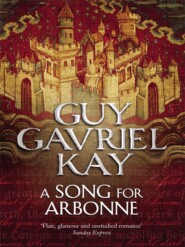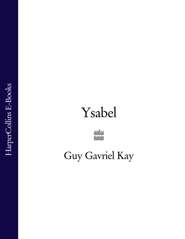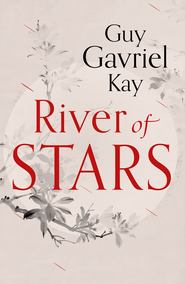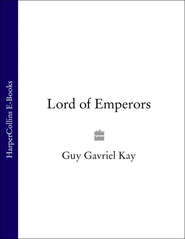По всем вопросам обращайтесь на: info@litportal.ru
(©) 2003-2025.
✖
The Lions of Al-Rassan
Автор
Год написания книги
2019
Настройки чтения
Размер шрифта
Высота строк
Поля
Alvar looked away from the Captain and rode for a time thinking hard. He didn’t know it, but his face bore an expression that used to induce apprehension in his family. His thoughts sometimes took him to unexpected, dangerous places. This, as it happened, was such a time. He glanced over at Ser Rodrigo and then away again, uncharacteristically cautious.
“Say it!” the Captain snapped.
Alvar suddenly wished he were back on the farm, planting grain with his father and the farm hands, waiting for one of his sisters to walk out with beer and cheese and bread, and gossip from the house. He swallowed. He might be back there, soon enough. But it had never been said that Pellino de Damon’s son was a coward or, for that matter, overly shy with his thoughts.
“You weren’t thinking about me,” he said as firmly as he could manage. There was no point saying this if he sounded like a quavering child. “You pulled me out to be a body between Count Gonzalez and your family. I may be nothing in myself, but my father was known, and the constable now realizes that I’m a witness to what happened this morning. I’m protection for your wife and sons.”
He closed his eyes. When he opened them it was to see Rodrigo Belmonte grinning at him. Miraculously, the Captain didn’t seem angry. “As I said, there was a reason you were chosen to be tested on this ride. I don’t mind a clever man, Alvar. Within limits, mind you. You may even be right. I may have been entirely selfish. When it comes to threats against my family, I can be. I did make a possible enemy for you. I even put your life at some risk. Not a very honorable thing for a leader to do to one of his company, is it?”
This was another test, and Alvar was aware of it. His father had told him, more than once, that he would do better if he thought a little less and spoke a great deal less. But this was Ser Rodrigo Belmonte himself, the Captain, asking questions that demanded thought. He could dodge it, Alvar supposed. Perhaps he was expected to. But here they were, riding towards Al-Rassan through the pine-clad hills of Vargas, which he had never seen, and he was in this company for a reason. The Captain had just said so. They weren’t going to send him back. Alvar’s customary nature seemed to be returning to him with every passing moment.
Alvar de Pellino said, “Was it an honorable thing to do? Not really, if you want my true thought, my lord. In war a captain can do anything with his men, of course, but in a private feud I don’t know if it’s right.”
For a moment he thought he had gone too far. Then Ser Rodrigo smiled again; there was real amusement in the grey eyes. The Captain stroked his moustache with a gloved hand. “I imagine you caused your father some distress with your frankness, lad.”
Alvar grinned back. “He did caution me at times, my lord. Yes.”
“Cautioned?”
Alvar nodded. “Well, in fairness, I don’t know what more he—”
Alvar was not a small man, and there had been nothing easy about life on a northern farm, and even less that was conducive to softness during a year of service with the king’s army in Esteren. He was strong and quick, and a good rider. Nonetheless, the fist he never saw coming hit the side of his head like a hammer and sent him flying from his horse into the grass as if he’d been a child.
Alvar struggled quickly to a sitting position, spitting blood. One hand went feebly to his jaw, which felt as if it might be broken. It had happened: his father’s warning had just come true. His imbecilic habit of speaking whatever he thought had just cost him the opportunity any young soldier would die for. Rodrigo Belmonte had opened a door for him, and Alvar, swaggering through like the fool he was, had just fallen on his face. Or on his elbow and backside, actually.
Holding a hand to his face, Alvar looked up at his Captain. A short distance away the company had come to a halt and was regarding the two of them.
“I’ve had to do that to my sons, too, once or twice,” Rodrigo said. He was, improbably, still looking amused. “I’ll doubtless have to do it for a few years yet. Third lesson now, Alvar de Pellino. Sometimes it is wrong to hide as you did by the wagon. Sometimes it is equally wrong to push your ideas forward before they are complete. Take a little longer to be so sure of yourself. You’ll have some time to think about this while we ride. And while you are doing so, you might consider whether an unauthorized raid in Al-Rassan by a band of Garcia de Rada’s cronies playing outlaw might take this affair out of the realm of a private feud and into something else. I am an officer of the king of Valledo, and while you are in this company, so are you. The constable attempted to suborn me from my duty to the king with a threat. Is that a private matter, my young philosopher?”
“By the god’s balls, Rodrigo!” came an unmistakable voice, approaching from the head of the column. “What did Pellino’s brat do to deserve that?”
Ser Rodrigo turned to look at Laín Nunez trotting his horse over towards them. “Called me selfish and unfair to my men. Guilty of exploiting them in my private affairs.”
“That all?” Laín spat into the grass. “His father said a lot worse to me in our day.”
“Really?” The Captain seemed surprised. “De Rada just said he was famous for his discretion.”
“Horsepiss,” said Laín Nunez succinctly. “Why would you believe anything a de Rada said? Pellino de Damon had an opinion about anything and everything under the god’s sun. Drove me near crazy, he did. I had to put up with it until I wangled him a promotion to commanding a fort by the no-man’s-land. I was never as happy in my life as when I saw his backside on a horse going away from me.”
Alvar goggled up at both of them; his jaw would have dropped if it hadn’t hurt so much. He was too stunned to even get up from the grass. For most of his life his quiet, patient father had been gently chiding him against the evils of being too outspoken.
“You,” Ser Rodrigo was saying, grinning at the veteran soldier beside him, “are as full of horsepiss as any de Rada I’ve ever met.”
“That, I’ll tell you, is a deadly insult,” Laín Nunez rasped, the seamed and wizened face assuming an expression of fierce outrage.
Rodrigo laughed aloud. “You loved this man’s father like a brother. You’ve been telling me that for years. You picked his son yourself for this ride. Do you want to deny it?”
“I will deny anything I have to,” his lieutenant said sturdily. “But if Pellino’s boy has already driven you to a blow I might have made a terrible mistake.” They both looked down at Alvar, shaking their heads slowly.
“It may well be that you have,” said the Captain at length. He didn’t look particularly concerned. “We’ll know soon enough. Get up, lad,” he added. “Stick something cold on the side of your face or you’ll have trouble offering opinions about anything for a while.”
Laín Nunez had already turned to ride back. Now the Captain did the same. Alvar stood up.
“Captain,” he called, with difficulty.
Ser Rodrigo looked back over his shoulder. The grey eyes regarded him with curiosity now. Alvar knew he was pushing things again. So be it. It seemed his father had been that way too, amazingly. He was going to need some time to deal with that. And it seemed that it wasn’t his mother’s pilgrimage to Vasca’s Isle that had put him in this company, after all.
“Um, circumstances prevented me from finishing my last thought. I just wanted to say also that I would be proud to die defending your wife and sons.”
The Captain’s mouth quirked. He was amused again. “You are rather more likely to die defending yourself from them, actually. Come on, Alvar, I meant it about putting something on your jaw. If you don’t keep the swelling down you’ll frighten the women in Fezana and ruin your chances. In the meantime, remember to do some thinking before next you speak.”
“But I have been thinking—”
The Captain raised a hand in warning. Alvar was abruptly silent. Rodrigo cantered back to the company and a moment later Alvar led his own horse by the reins over to where they had halted for the midday meal. Oddly enough, despite the pain in his jaw, which a cloth soaked in water did only a little to ease, he didn’t feel badly at all.
And he had been thinking, already. He couldn’t help it. He’d decided that the Captain was right about Garcia de Rada’s raid taking the matter out of the area of a private feud and into the king’s affairs. Alvar prided himself that he had always been willing to accept when someone else made a shrewd point in discussion.
ALL THAT was days in the past. A swollen but not a broken jaw had assisted Alvar in the difficult task of keeping his rapidly evolving thoughts to himself.
The twice-yearly collection of the parias from Fezana had become something close to routine now, more an exercise in diplomacy than a military one. It was more important for King Ramiro to dispatch a leader of Ser Rodrigo’s stature than to send an army. They knew Ramiro could send an army. The tribute would not be refused, though it might be slow in coming and there was a kind of dance that had to be performed before they could ride back with gold from Al-Rassan. This much Alvar learned during the shifts he rode ahead of the party with Ludus or Martín, the most experienced of the outriders.
They taught him other things too. This might be a routine expedition, but the Captain was never tolerant of carelessness, and most particularly not so in the no-man’s-land, or in Al-Rassan itself. They were not riding south to give battle, but they had an image, a message to convey: that no one would ever want to do battle with the Horsemen of Valledo, and most particularly not with those commanded by Rodrigo Belmonte.
Ludus taught him how to anticipate from the movements of birds the presence of a stream or pond in the windswept plateau. Martín showed him how to read weather patterns in the clouds—the clues were very different here in the south from those Alvar had known in the far north by the sea. And it was the Captain himself who advised him to shorten his stirrups. It was the first time Ser Rodrigo had spoken directly to Alvar since flattening him with that blow on the first morning.
“You’ll be awkward for a few days,” he said, “but not for longer than that. All my men learn to ride like this into battle. Everyone here knows how. There may come a time in a fight when you need to stand up in the saddle, or leap from your horse. You’ll find it easier with the stirrups high. It may save your life.”
They had been in the no-man’s-land by then, approaching the two small forts King Ramiro had built when he began claiming the parias from Fezana. The garrisons in the forts had been desperately glad to see them, even if they stayed only a single night in each, to leave letters and gossip and supplies.
It had to be a lonely, anxious life down here in Lobar and Baeza, Alvar had realized. The balance in the peninsula might have begun to shift with the fall of the Khalifate in Al-Rassan, but that was an evolving process, not an accomplished reality, and there had been more than a slight element of provocation in the Valledans placing garrisons, however small, in the tagra lands. These were a handful of soldiers in a vast emptiness, perilously near to the swords and arrows of the Asharites.
King Ramiro had tried at the beginning, two years ago, to encourage settlement around the forts. He couldn’t force people to make their way down there, but he’d offered a ten-year tax exemption—given the costs of a steadily expanding army, not a trivial thing—and the usual promise of military support. It hadn’t been enough. Not yet. Only fifteen or twenty families, clearly leaving hopeless situations in the north, had been brave or rash or desperate enough to try making lives for themselves here on the threshold of Al-Rassan.
Things might be changing year by year, but the memory of the Khalifate’s armies thundering north through these high plains was a raw one yet. And everyone with a head above the ground knew the king was too fiercely engaged by his brother and uncle in Ruenda and Jaloña to be reckless in support of two speculative garrisons in the tagra and the families who huddled around them.
The balance might be shifting, but it was still a balance, and one could ignore that only at peril. Thinking, as they continued south, about the narrowed eyes and apprehensive faces of the men and women he’d seen in the fields beside the two forts, Alvar had decided there were worse things for a farmer to contend with than thin soil and early frosts in the north by the Ruenda border. Even the fields themselves down here had seemed pathetic and frail, small scratchings in the wide space of the otherwise empty land.
The Captain hadn’t seemed to see it that way, though. Ser Rodrigo had made a point of dismounting to speak to each of the farmers they saw. Alvar had been close enough to overhear him once: the talk was of crop rotation and the pattern of rainfall here in the tagra lands.
“We aren’t the real warriors of Valledo,” he’d said to his company upon mounting up again after one such conversation. “These people are. It will be a mistake for any man who rides with me to forget that.”
His expression had been unusually grim as he spoke, as if daring any of them to disagree. Alvar hadn’t been inclined to say anything at all. Thinking, he’d rubbed his bruised jaw through the beginnings of a sand-colored beard and kept silent.
The flat, high landscape of the plateau did not change, and there were no border markings of any kind, but late the following afternoon old Laín Nunez said aloud to no one in particular, “We’re in Al-Rassan now.”
THREE DAYS LATER, nearing sundown, the outriders caught a glimpse of the Tavares River and, not long after, Alvar saw for the first time the towers and walls of Fezana, tucked into a northward bend of the river, honey-colored in the westering light.
It was Ludus who first noticed the strange thing. An astonishing number of carrion birds seemed to be circling and swooping above the river by the northern wall of the city. Alvar had never seen anything like it. There had to be thousands of them.











